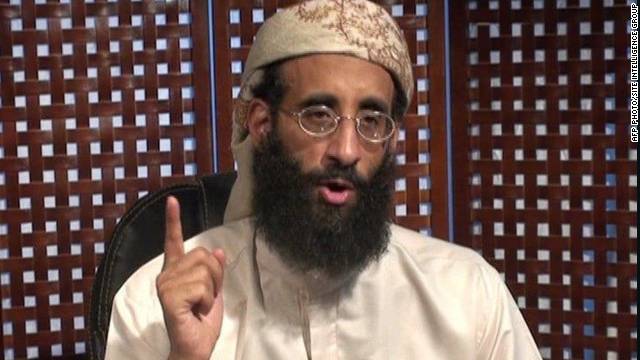October 1, 2011 -- Updated 1741 GMT (0141 HKT)

Anwar al-Awlaki was killed in a U.S. drone strike in Yemen.
STORY HIGHLIGHTS
- NEW: Eyewitnesses report airstrikes in Arhab district north of Sanaa
- Anwar al-Awlaki's father on his way to confirm his son's death, family says
- U.S. official says top bomb maker was likely with al-Awlaki during attack
- U.S.: Al-Awlaki's death "could provide motivation for homeland attacks"
The FBI and the Department of Homeland Security issued a joint bulletin late Friday that warned supporters might seek to portray al-Awlaki as a martyr in a supposed U.S. war against Islam.
It said the deaths "could provide motivation for homeland attacks" by "homegrown violent extremists," the type the two men allegedly tried to recruit or inspire.
A similar bulletin was issued following the killing of Osama bin Laden.
The latest bulletin came the same day officials said al-Awlaki -- an American whose fluency with English and technology made him a top terrorist recruiter -- was killed in a U.S. drone strike in Yemen.
Three others were killed in the attack including Samir Khan, an American, who produced the terrorist network's English-language online magazine, Inspire.
A U.S. official told CNN Saturday that there are indications that Ibrahim Hasan al-Asiri, a top bomb maker for al Qaeda in the Arabian Peninsula, was at the scene of the attack but couldn't confirm whether he had been killed. U.S. officials believe Al-Asiri was behind the thwarted 2009 Christmas day "underwear" bomb as well as a failed October 2010 plot to put explosive devices on cargo planes headed to the United States.
Al-Awlaki's father, Nasser al-Awlaki, left the Yemeni capital, Sanaa, Saturday for Jawf and Marib provinces to confirm that his son was dead, family members told CNN. Tribesmen in Marib province said Friday that they had seen the victims of the drone strike and that their bodies were charred beyond recognition.
Tribesmen said Saturday that the bodies were under their control and they would only be handed over to direct relatives.
"It's any family's right to bury their loved one, and we will ensure that that simple right is granted," said a tribal leader in the town of Khashef, where officials said the CIA drone attack occurred.
Meanwhile, the chief of the U.N. team responsible for monitoring al Qaeda activities said he was keeping an eye on the reaction to the killing in Yemen and what it could mean for the country.
Yemen has been wracked by political and social unrest as protesters call for the end of President Ali Abdullah Saleh's rule, a crisis that has allowed al Qaeda in the Arabian Peninsula to gain a foothold in the southern part of the country. Saleh has resisted calls to step down, saying the country would fall into the hands of terrorists and militants if he relinquished control.
On Saturday, Yemen's state TV quoted a military source as saying forces were making progress in their fight against al Qaeda and have cleared large parts of Zinjibar, a port city in the southern province of Abyan.
In the Arhab district, north of Sanaa, eyewitnesses reported airstrikes and rocket propelled grenade attacks by government forces on residential villages. No casualties were immediately reported.
Al-Awlaki was under the protection of his family's large and powerful al-Awlaki tribe, which was once aligned to Saleh, Richard Barrett, the coordinator of the U.N. monitoring team, told CNN.
Barrett called al-Awlaki's killing a significant setback for al Qaeda in the Arabian Peninsula.
"I can't think of a single individual who could take his place," he said.
A U.S. administration official said the mission, codenamed Operation Troy, was similar to the one in May that killed al Qaeda leader Osama bin Laden in that it was commanded by the CIA, with close coordination with Joint Special Operations Command.
The CIA and the command had al-Awlaki under surveillance for at least two weeks, but were awaiting an opportunity to kill him without causing civilian casualties or damage, the administration official said.
U.S. military helped target al-Awlaki and manned American military aircraft were flying overhead ready to offer assistance. The drone was operated by the CIA, officials said.
U.S. President Barack Obama said the death is a "major blow" to al Qaeda, reeling still from the killing and capture this year of several top leaders, most notably bin Laden.
A Yemeni government official told CNN that the killing was the result of a "successful joint intelligence-sharing operation" between Yemen and the United States. The official asked not to be named because he is not authorized to speak to the news media.
The United States regarded al-Awlaki as a terrorist who posed a threat to American homeland security. Western intelligence officials said they believe al-Awlaki was a senior leader of AQAP, one of the world's most active al Qaeda affiliates.
Al-Awlaki was killed near Khashef town, east of the capital, Sanaa, said Mohammed Basha, a spokesman for the Yemeni Embassy in Washington.
Born in Las Cruces, New Mexico, he lived in the United States until the age of 7, when his family returned to Yemen. He returned to the United States in 1991 for college and remained until 2002.
During his stay in the U.S., he served as imam in California and Virginia, and interacted with three of the men who went on to become September 11, 2001, hijackers, according to the 9/11 Commission report. He publicly condemned the attack afterward.
U.S. officials say he recruited Umar Farouk AbdulMutallab, the Nigerian man known as the underwear bomber, who was charged with trying to blow up a trans-Atlantic flight as it landed in Detroit on December 25, 2009.
The militant cleric is also said to have exchanged emails with accused Fort Hood shooter Maj. Nidal Hasan, who is accused of killing a dozen fellow soldiers in Texas.
CNN's Sarah Jones, Adam Levine, Mohammed Jamjoom, Barbara Starr, Lesa Jansen and Diane Ruggiero and journalist Hakim Almasmari contributed to this report.

No comments:
Post a Comment